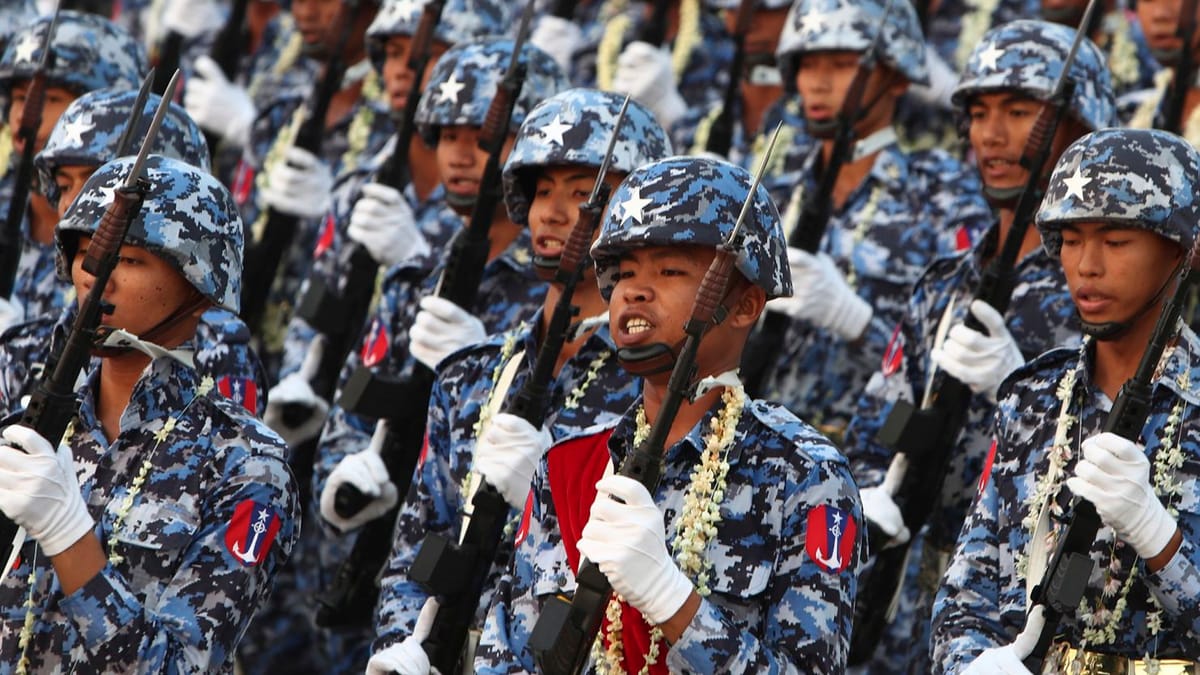Mandatory Conscription and the Future of Myanmar at Stake

By Anonymous
On February 10th 2024, the Commander-in-Chief of Defence Services (Tatmadaw) and junta leader Min Aung Hlaing announced the implementation of mandatory military conscription in Myanmar. Since the Tatmadaw took power in 2021, it has suffered massive losses in the control of its territory at the hands of ethnic armed organisations (EAOs) and anti-junta People’s Defence Forces (PDFs). The announcement was made live on state-controlled media outlets which has driven the population into a state of panic.
Under the 2010 People’s Service Law, Myanmar citizens aged 18 to 35 for eligible males and 18 to 27 for eligible females will have to undergo at least two years of military service, which is extendable to five years during an ‘emergency’ period. Failure to fulfil their conscription duties or attempts to evade them will result in up to five years of imprisonment. According to the Diplomat, those who are permanently exempted include married women, members of religious orders and people with disabilities. Students at publicly recognised universities will be temporarily deferred until the completion of their studies.
Following the announcement of this law, the National Unity Government (NUG) in exile, released a statement on X, formerly known as Twitter, stating that the announcement itself was unlawful and had no legal authority. The statement ended with a plea urging the people of Myanmar to join the ‘revolution’, and EAOs and PDFs to cooperate with them to defeat the junta.
This new law has left the supermajority of Myanmar citizens with two viable options: move abroad or become a revolutionary. Consequently, it has been reported by the BBC that several Burmese families are choosing to move to Thailand or Singapore, while those who are wealthier are looking as far as Europe. The Thai embassy in Yangon has had to limit their long-stay visa appointments to 400 per day due to overwhelming demand, triggering long queues outside the embassy and passport offices across the country. In Mandalay, two deaths occurred outside the passport office as a result of a crowd crush. Yet, although Myanmar’s neighbours (except Laos) are popular migration destinations for Burmese nationals, only China is a ratified party to the 1951 Refugee Convention. This means that most of those fleeing will only receive temporary shelter before being subjected to arrest or deportation.
As for the latter, the Voice of America reported that over 90% of Burmese youth were keenly opposed to the military junta. The Guardian commented that the majority of conscription targets will be those from poor, rural areas who are extremely against military rule but do not have the financial capabilities to ‘escape’ service. If these people are recruited to serve against their will, they are more likely to shoot the generals than be forced to shoot their own people.
Despite these reactions, the junta is adamant about ensuring the smooth enforcement of this conscription law. According to junta spokesperson Zaw Min Tun, the first recruitment will commence in April after Thingyan (Burmese New Year), with an expected 5,000 eligible males to enter military training. Eligible females will not be recruited until September. The junta expects to recruit up to 50,000 people annually but this is still uncertain due to fiscal constraints. District-level offices will manage the recruitment process rather than the Ministry of Defence.
While the junta is trying to reassure the public that the law is not a “desperate measure,” its opposition has painted a different picture. Khun Bedu, chair of the Karenni Nationalities Defence Force (KNDF), said that the Tatmadaw has fewer than 150,000 troops with less than half on the frontline due to multiple desertions and defections since the coup. Under these circumstances, it is becoming harder for the junta to justify whether this law would use these recruits as ‘human shields’.
“By trying to legally force young people to take up arms, they are fueling the intensity of ethnic conflicts, mass brain drain and denying investments that could improve the quality of life for future generations.”
As the Myanmar military scrambles to govern, the introduction of this conscription law is doing nothing but creating dire consequences for the nation. By trying to legally force young people to take up arms, they are fueling the intensity of ethnic conflicts, mass brain drain and denying investments that could improve the quality of life for future generations. Similarly, the rise of anti-junta resistance begs the question of whether a sustainable post-junta model of Myanmar could be developed that would not repeat its predecessor’s mistakes.
Regardless, the Myanmar military is gradually weakening, and as the world glances, the future of Myanmar hangs in the balance, with its people feeling helpless without the attention this crisis deserves.
Photo caption: Myanmar Navy personnel marching to commemorate Armed Forces Day in Naypyidaw, 2023 (Credit: Associated Press)



